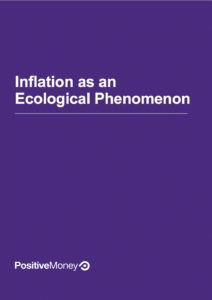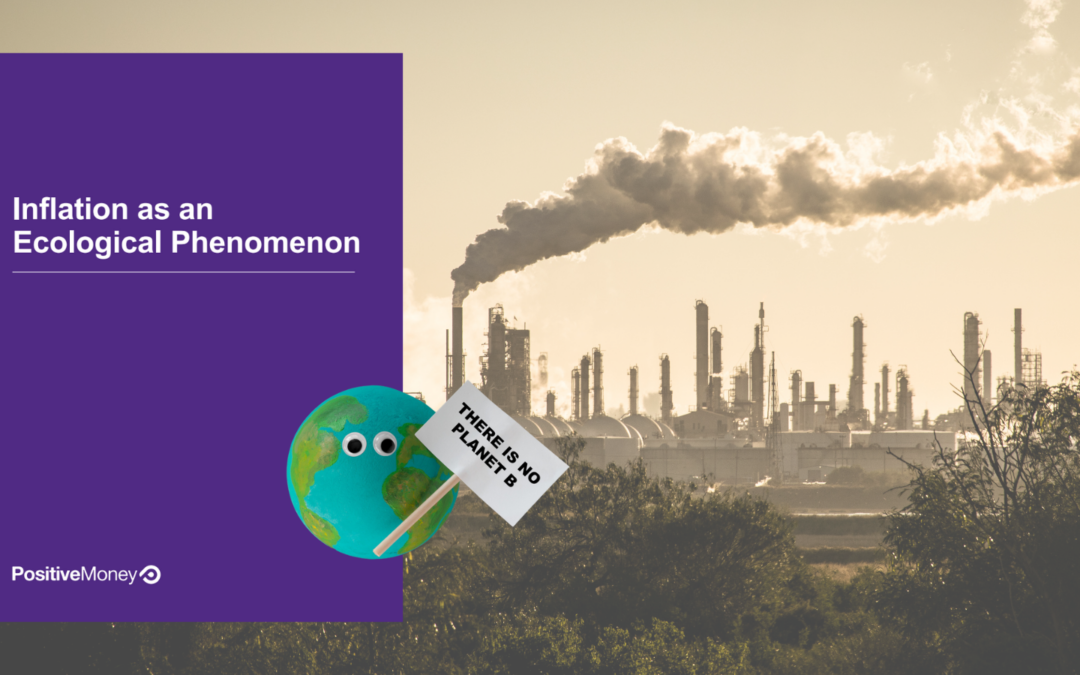We are excited to share our latest policy report, co-authored with Grantham Research Institute: ‘Inflation as an ecological phenomenon’. The report shows clearly how the planet’s worsening environmental situation and a reliance on fossil fuels both contribute to rising prices.
 So-called ‘fossilflation’ and ‘climateflation’ are also shown to have a more significant impact on the lives of low-income households and countries. But what do these two words mean?
So-called ‘fossilflation’ and ‘climateflation’ are also shown to have a more significant impact on the lives of low-income households and countries. But what do these two words mean?
The global economy has long been known to be highly vulnerable to volatile changes in the price of fossil fuels, on which production depends heavily. This is exactly what fossilflation describes: energy prices skyrocketing because the cost of fossil fuels fluctuates dramatically. This was felt most recently after Russia’s invasion of Ukraine caused a shock to the supply of oil.
Climateflation is defined as the significant rise in prices triggered by the impact of climate change, as extreme weather events. The most classic and typical example is the increase in food prices, where we see prices go up due to fewer goods being produced as a result of a reduction in agricultural activity and damage to crop yields.
The report states that in the immediate future, to avoid persistent environment-related macroeconomic instability, central banks must acknowledge the existence of fossilflation and climateflation, and adapt their policymaking accordingly.
There needs to be a move towards a sustainable economy, as well as new approaches in the monetary policies of central banks. Why? The reason is simple: climate change is also modifying our economy! As environmental problems like extreme weather and pollution get worse, they’re going to make prices more unstable.
Traditional ways of managing interest rates don’t really help with this instability, and show an incapacity to tackle the climate crisis with old solutions.
Raising interest rates doesn’t address the root causes of higher food and energy prices, like droughts or hurricanes.
Instead, it makes it even harder for companies to invest in renewables.
Dual interest rates – where a favourable rate is offered to investors in green projects – are one way in which the report suggests central banks could factor environmental considerations into their policymaking.
Such a policy, and one that we have been advocating for years, was recently endorsed by French president Emmanuel Macron.
Environmental disruptions are set to have a greater impact on causing unpredictable price changes. This underlines the importance of key financial institutions, like central banks, stepping in and playing their part in changing the game.
Read the full report here


Thanks for your article and this new report and your ongoing focus on money.
To stay objective, it should at least be noted that the ECB’s approach to incorporating climate change into its operations has been a subject of both support and criticism.
Critics often argue from two main perspectives:
Legal and Mandate Concerns: Some argue that the ECB, by taking a more active role in climate change, might overstep its primary mandate of price stability, venturing into areas that should be the purview of political and legislative bodies. They worry about the central bank’s independence and the potential for it to engage in what could be seen as fiscal policy or political decisions, which are beyond its mandate as defined by the EU treaties.
Effectiveness and Scope: Others question the effectiveness of the ECB’s measures in combating climate change or argue that the central bank might not be using its tools effectively or broadly enough to address the urgency of climate risks.
Other than that:
It states that the inflation of energy prices was triggered by Russia’s invasion of Ukraine, which is, of course, incorrect. The primary trigger was actually the response of the EU and the US to the invasion, rather than the invasion itself.
The terms “climateflation” and “fossilflation” are intriguing; however, the overall tendency seems to blame inflation on climate change rather than on the excessive money supply by the ECB and the EU’s lack of budgetary discipline.
The report touches on very important topics concerning inequality. Inflation has acted as a wealth transfer mechanism for decades, affecting various groups within an economy in different ways. This is not related to climate change per se, and has always been a consequence of the policy of the governing authorities. Why should the same authorities that created inflation and enlarged the wealth gap be the instrument of choice to prevent this in the future?
The report advocates for more government intervention and additional stimulus policies, leading to further disruption of our natural economy. It assumes that the government has full control over the economy and can predict and control all the side and adverse effects of its measures, without explicitly stating these and securing broad-based support societal for the consequences. The report would be more valuable if a paragraph or chapter was dedicated to this.
The focus on inflation distracts from the key message: “If energy becomes more expensive in the future and outweighs the deflationary effects of innovation, we must be prepared to adjust our standard of living to support the energy transition.”
Thank you once more for sharing the publication and for your dedication to advancing positive financial strategies! The topics of climate change and inflation are both significant and intricate, necessitating open discussion in the public sphere.
Peter
http://www.monetarymadness.world
Dear Peter
Thank you for getting in touch and for your interest in the work of Positive Money.
It’s really interesting to read your detailed perspective, thanks for taking the time.
We would like to briefly respond to some of the points you raise, as discourse is utterly invaluable in the process of making a fairer, democratic and sustainable economy.
You say that some people ‘worry about the central bank’s independence and the potential for it to engage in what could be seen as fiscal policy or political decisions, which are beyond its mandate as defined by the EU treaties.’ In response, we would say in that regard, because climate change has an impact on price stability, as well as on financial stability and the ECB’s secondary mandate, it surely falls within its mandate.
You went on to question our use of the terms “climateflation” and “fossilflation” saying that ‘the overall tendency seems to blame inflation on climate change rather than on the excessive money supply by the ECB and the EU’s lack of budgetary discipline.’ Positive Money says that inflation is not caused by an increase in “money supply” by the ECB. If it were, how would it have been possible for the ECB to fail to reach its inflation target at the same time that it increased its balance sheet from 2015 onwards – through the APP and TLTROs programmes. We argue that climate change has an impact on inflation and this impact will keep on increasing as climate change intensifies, because there are plenty of empirical studies that show this link, which we cite in the report.
On one final point, you said “the focus on inflation distracts from the key message: “If energy becomes more expensive in the future and outweighs the deflationary effects of innovation, we must be prepared to adjust our standard of living to support the energy transition.” We don’t think that is true and strongly believe supporting the energy transition is the way to provide clean and cheap energy, without continuing to burn fossil fuels that intensify climate change
Thank you again for being in touch and we look forward to your reaction to future reports from us.